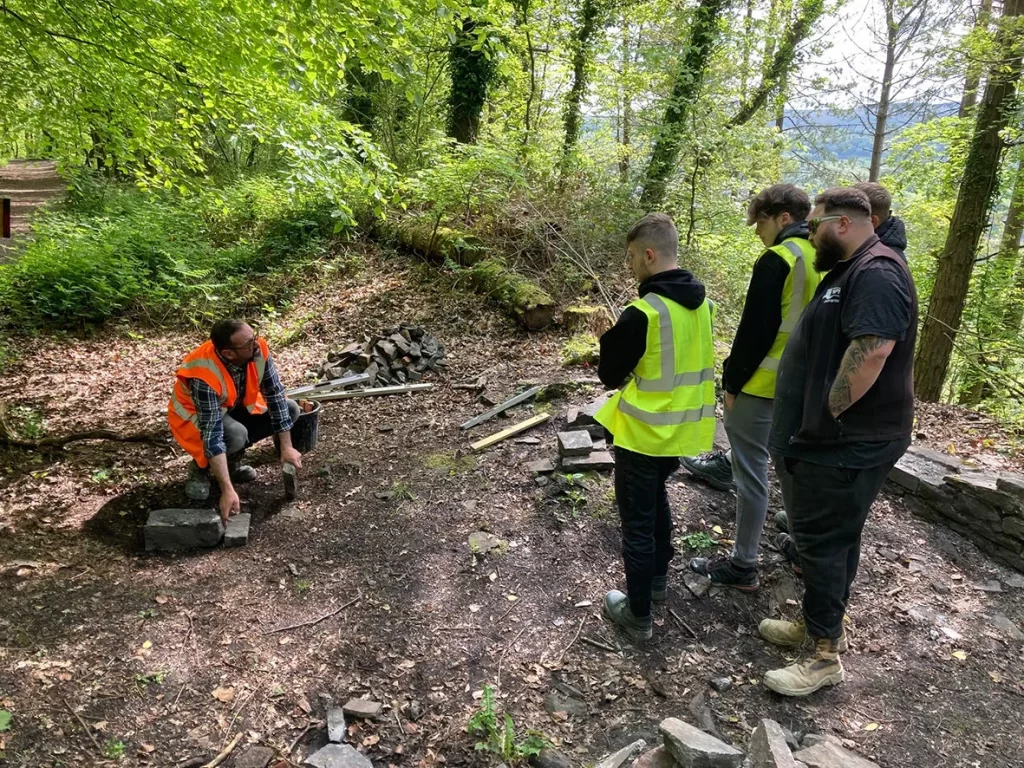
From Swansea Bay News, 6th June 2023
Seventeen students from Neath College have been invited to work on a remarkable restoration project, breathing new life into an old smithy at Craig Gwladus Country Park.
Thom Alun Kinghorn-Evans from the SPAB demonstrates traditional techniques to Neath College students.
The work has taken place over a 10-day onsite placement organised by Swansea University and Craig Gwladus Park Manager, Lisa Kirman, and funded by CITB as part of the South West Wales Onsite Hub programme coordinated by Cyfle Building Skills.
Over the ten days, the students have been granted a rare opportunity to engage with traditional materials, while working on a project of significant historical and archaeological importance, under the guidance of experts in their fields.
Eight of the Neath College students are pursuing a Construction Level 1 Multi-trade qualification, while the remaining nine are working towards a Foundation in Construction Bricklaying / Construction Civils. Through this placement, all the students have gained invaluable experience in heritage restoration and traditional skills – a rare opportunity which will undoubtedly enhance their future career prospects upon completion of their qualifications. There is also the wider aim that by including students on such projects it will go some way to help fill the skills gap regarding restoration of historic buildings and monuments.
Leading the historic recovery and reconstruction efforts at Craig Gwladus is Dr. Alex Langlands from Swansea University’s Centre for Heritage Research and Training. Langlands first extended the invitation for the students to help at the site as a unique learning experience, and generously shared his knowledge of the site’s history with the students before they commenced work.
In advance of the placement, Archaeology Wales undertook an assessment of the site, and Thom Alun Kinghorn-Evans from the Society for the Protection of Ancient Buildings (SPAB) has been engaged to work on the restoration of the park’s historic buildings. Throughout the students’ placement, he has provided expert guidance on the use of traditional materials and methods, including the application of lime mortar. The students have also been accompanied and supervised by Ieuan Humphreys, Neath College’s Bricklaying Instructor and former Cyfle Building Skills apprentice, along with Jamie Piper, Centre Manager of Maesteg Construction Centre of Excellence.
Although the structures are not officially listed, the involvement of SPAB, an organisation dedicated to preserving historic structures, underscores the commitment to carrying out the restoration sympathetically and in accordance with the advice provided by CADW – the Welsh Government’s historic environment service.
To ensure the safety and success of the project, all 17 students were equipped with the necessary personal protective equipment (PPE) and toolkits, with the costs covered by the South West Wales Onsite Hub programme funded by CITB. Additionally, the students received Low Carbon Training from Cyfle’s Training Coordinator, Shaun Williams, prior to commencing their 10-day placement.
The old smithy is just one of several remnants of the area’s rich industrial heritage that are being uncovered at Craig Gwladus Country Park. The site also features remains of an old engine house and bridge believed to have been constructed in the 1870’s, when the site was developed as Gelliau Colliery.
This heritage work aligns with the wider transformation of the park, spearheaded by Lisa Kirman, Craig Gwladus Project Manager, Neath Port Talbot County Borough Council and funded by the National Lottery Heritage Fund and Research Wales Innovation Fund. Craig Gwladus Country Park, renowned for its dense woodlands, captivating rock formations, diverse wildlife habitats, and coal-mining legacy, is interconnected by a network of scenic footpaths. The restored structures will further enhance the experience for visitors to the park, members of the local community, and those interested in the area’s industrial past.
Dr. Alex Langlands, Swansea University’s Centre for Heritage Research and Training, said: “The region has a substantial number of historic buildings on the ‘at risk’ register and by working with young people locally, we can begin to develop the next generation of home-grown talent to upskill in traditional heritage construction skills, providing our historic buildings with a sustainable future.”
Councillor Jeremy Hurley, Neath Port Talbot Council’s Cabinet Member for Climate Change & Economic Growth, said: “We are thrilled to host the students and provide a real-life opportunity for them to conserve the historic smithy at Craig Gwladus Country Park. This project is part of our broader efforts to transform the park and preserve its rich heritage that has been enabled through generous funding from the National Lottery Heritage Fund. The exciting collaboration we have developed with Swansea University, Neath College and SPAB is producing tangible results that are making a real difference to people and place.”
Thom Alun Kinghorn-Evans from SPAB, added: “It has been a privilege to work with the students from Neath College on this heritage restoration project. By utilising traditional materials and methods, we are ensuring that the historic smithy retains its authentic character. It is heartening to witness the next generation embrace these valuable skills and contribute to the preservation of our built heritage.”
Jamie Piper, Centre Manager of Maesteg Construction Centre of Excellence, commented: “The students have demonstrated tremendous dedication and enthusiasm throughout this project. Working on the restoration of the old smithy at Craig Gwladus Country Park has provided them with invaluable hands-on experience in heritage and restoration work. It has been a pleasure guiding them through this journey and witnessing their growth as skilled tradespeople.”
Rhys Fisher, Onsite Hub Coordinator, Cyfle Building Skills, added: “This placement at Craig Gwladus Country Park has allowed the students to apply their theoretical knowledge in a real-world setting, honing their skills and preparing them for successful careers in the construction industry. We commend their hard work and dedication.”


